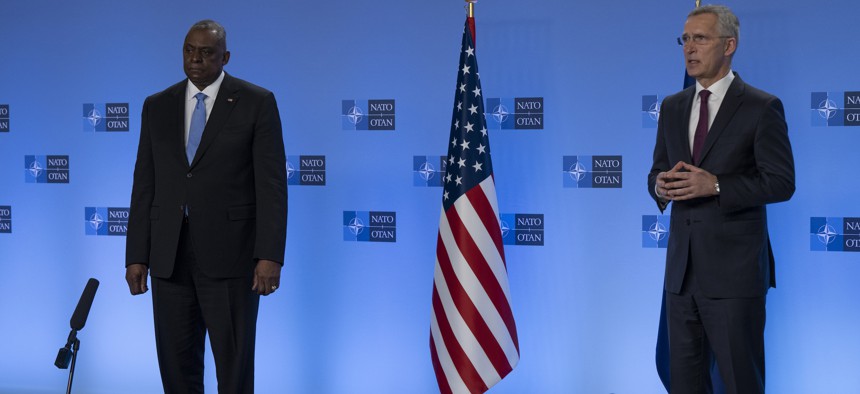
Secretary of Defense Lloyd J. Austin III and NATO Secretary General Jens Stoltenberg address the media prior the North Atlantic Treaty Organization (NATO) defense ministerial meetings at NATO headquarters in Brussels, Belgium, Feb. 16, 2022. DOD / Chad J. McNeeley
Austin is Alarmed by Beijing’s Approval, As Russia Moves Troops From China's Border to Ukraine
Russians “edge closer to that border,” with troops, combat aircraft, ships, and blood supplies, says Pentagon.
Russia’s decision to move troops from its border with China to add to its buildup around Ukraine has alarmed Defense Secretary Lloyd Austin, who said it signaled Beijing’s “tacit approval” of President Vladimir Putin’s actions.
Austin and NATO Secretary General Jens Stoltenberg said the buildup of Russian forces has continued to increase over the last several days, in a joint press conference at NATO headquarters in Brussels on Thursday. As many as 7,000 additional Russian forces had arrived in the last several days, a senior Biden administration official told reporters on Wednesday.
“Despite Moscow’s claims, we have seen no signs of withdrawal or de-escalation. On the contrary, Russia’s buildup appears to continue,” Stoltenberg said.
“Even in the last couple of days, we see some of those troops edge closer to that [Ukrainian] border,” Austin said. “We see them fly in more combat and support aircraft. We see them sharpen their readiness in the Black Sea. We even see them stocking up their blood supplies.”
Austin confirmed that some of those additional forces have come from Russia’s far eastern border with China.
“We did note with alarm China’s tacit approval of Putin’s activities here in the region,” Austin said. “Certainly those are things we are going to watch going forward.”
Secretary of State Antony Blinken, in a last minute schedule change, is traveling to New York on Thursday morning for a rare face-to-face with the U.N. Security Council. Blinken was about to depart for Europe, where he is scheduled to appear at the Munich Security Conference alongside Vice President Kamala Harris and other Biden administration and European officials.
At the press conference, Austin also announced that an additional Germany-based Stryker company would be deploying to Bulgaria for exercises.
“Mr. Putin says he does not want a strong NATO on his western flank. He is getting exactly that,” Austin said.
Stoltenberg and Austin faced skepticism on the troop numbers and intelligence the U.S. and alliance was providing. Reporters asked why U.S. and NATO shared intelligence should be accepted at face value, including that Russia might stage a “false flag” operation as a pretext for war, or the prediction that Ukraine would be attacked on Feb. 16, which it wasn’t.
“I don’t see this as a competition of narratives,” Austin said. But to address concerns about public trust in U.S. intelligence, “the solution is to continue to be transparent, to continue to talk to the American people and people around the world, quite frankly, and explain what we are seeing.”







